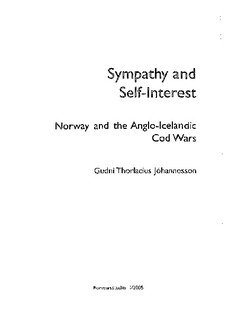| dc.contributor.author | Jóhannesson, Gudni Thorlacius | |
| dc.date.accessioned | 2011-10-14T08:57:58Z | |
| dc.date.available | 2011-10-14T08:57:58Z | |
| dc.date.issued | 2005 | |
| dc.identifier.issn | 0333-3981 | |
| dc.identifier.uri | http://hdl.handle.net/11250/99545 | |
| dc.description | This study is about Norway’s policy during Iceland’s fishing disputes with Britain 1948–76.
During this period, Iceland extended its fishing limit four times, from three to 200 nautical miles. Britain resisted every move and the two sides were embroiled in successive Cod Wars when the Royal Navy was sent to protect British trawlers from harassment by Icelandic coast guard vessels. At times the Icelanders seemed willing to leave NATO and expel the U.S. forces on the island.
These events inevitably affected Norway. The Norwegian public sided with the tiny Icelanders and the strategic connotations of the Cod Wars worried the Norwegian authorities. During the Cold War, Iceland’s participation in the Western alliance system was always considered necessary for the defence of Norway. Thus, Norway’s national interests in the Cod Wars were not always clear, or they were conflicting. What should determine Norwegian policy, sympathy for Iceland or the self-interested defence of Norway’s own interests? Or was it perhaps possible to combine the two? | en_US |
| dc.language.iso | eng | en_US |
| dc.publisher | Institutt for Forsvarsstudier | en_US |
| dc.relation.ispartofseries | Forsvarsstudier;1 | |
| dc.subject | Norge | en_US |
| dc.subject | Island | en_US |
| dc.subject | Storbritannia | en_US |
| dc.subject | torskekrigen | en_US |
| dc.subject | fiskerikonflikter | en_US |
| dc.title | Sympathy and self-interest: Norway and the Anglo-Icelandic Cod wars | en_US |
| dc.type | Others | en_US |
| dc.source.pagenumber | 148 s. | en_US |
